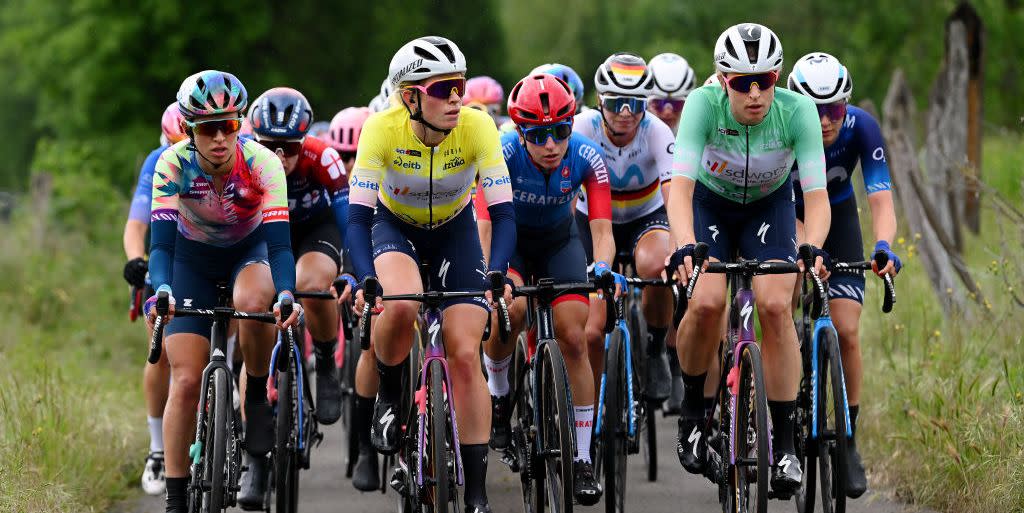Is Altitude Training the Key to Tour de France Femmes Success?

This year, something different is happening in the pro women’s peloton: More and more riders are consistently heading to altitude to train. While the practice of spending time at altitude has been commonplace for men’s teams in recent years, it’s only recently that more teams are starting to spend the money to bring women to altitude for training as well.
Andorra is the destination of choice this season, with riders from Canyon//SRAM, Human Powered Health, and SD Worx (to name a few) flocking to the countryside to take advantage of the average elevation of 2000 meters.
Altitude training works by allowing athletes to become more efficient at producing red blood cells to carry oxygen throughout the body. Because the air is less oxygen rich the higher you get, you have less oxygen to work with, and become more efficient. The effect remains even when you drop back down to sea level.
Most athletes will see benefits training above 4000 feet of altitude. Many will opt for the “live high, train low” approach for maximum efficiency: Living at a high altitude, then descending to do harder efforts on the bike so the intervals themselves aren’t impacted by the altitude. Andorra is one of the best places for this, since it’s relatively easy to make your way to lower altitude in a short amount of time.
All three riders who were on the podium of the Tour de France Femmes last year are taking advantage of altitude. SD Worx’ Demi Vollering just spent a two week training block in Andorra, having elected to skip riding in the Giro Donne in favor of more training time heading into the Tour de France Femmes.
She started the trip with a light day of hiking in order to acclimate to the thinner air before hopping on the bike. She wrapped up the camp a few days ago, descending from Andorra to jump into one more training race ahead of the Tour.
Meanwhile, Movistar’s Annemiek Van Vleuten came off of her Giro Donne win and put in one final training block at altitude in Italy. Her last hard ride was between 4,000 and 7,500 feet of elevation with over 9,000 feet of climbing. She opted for altitude earlier in the season as well, doing an altitude camp in the Alps.
Canyon//SRAM’s Kasia Niewiadoma also has spent blocks of time in Andorra this season, and says this is a big change for women’s cycling. “We’re seeing teams have better support and access to different details that they weren’t paying attention to before, like altitude, and when you’re at the top level, it’s all about little little details that can allow you to become slightly better,” she told Bicycling. “We see the importance of altitude camps, and how riders can now go to the mountains to gain those little percentages that make you stronger.”
Of course, altitude isn’t a magic pill—it requires a lot of careful planning and work. Niewiadoma has learned the importance of constant hydration with electrolyte mix while at altitude, and starts taking an iron supplement prior to going up. “It’s also so important to take it super easy the first three or four days because that’s when your body adapts to altitude,” she says. “This is a detail that’s easy for riders to miss when trying to maximize their training time.”
“It’s funny because you train hard, but you also have to try to rest even harder because your body suffers a lot just from that thin air you have in the mountain,” she adds. “So being super careful is very important.”
The big question on everyone’s mind as we head into the Tour de France Femmes next week is how the battle between Demi Vollering and Annemiek Van Vleuten is going to play out.
After the “pee stop” incident at the Vuelta Femenina where Vollering was taking a nature break when the Movistar team attacked, slingshotting Van Vleuten into the lead, Vollering certainly has an ax to grind. “Deception” is what she deemed the stage in a salty Instagram about the incident.
But Van Vleuten is seemingly unstoppable when it comes to her final season of Grand Tours and, unlike Vollering, who has no plans to retire, she’ll be looking for that one final feather in her (already well-feathered) cap.
Will all the altitude pay off? Make sure you’re tuned in on Sunday morning to watch stage 1!
You Might Also Like
